A Racial Justice Funder’s Different Take on Rapid Response
/ Tate Williams
photo: a katz/shutterstock
The rapid-response fund is one form of grantmaking that has become popular since the 2016 election, and the many threats that have followed.
These funds are usually smaller pools of money set up with more flexibility, independent of grantmaking cycles, and with simpler application processes than a typical proposal. While certainly not new, a number of funders have embraced them post-election as a way to move dollars toward immediate threats in more vulnerable communities.
Rapid-response funding can be a powerful tool, for sure, but groups working on issues of systemic racism and injustice more often see their work as dismantling deeply entrenched problems, rather than fielding short-term crises. The Akonadi Foundation, an Oakland-based funder, has taken this into account by shifting its rapid-response fund into something a little different—a “community-response fund” to support those working for long-term racial justice.
Since launching a rapid-response fund in 2016, Akonadi convened its grantees to learn more about what issues they were responding to, and it was not so much new or emerging threats, but persistent community problems like police brutality and displacement, according to Iris Garcia, learning and impact program officer.
In response, the fund became the So Love Can Win Community Response Fund, and still works a lot like what you could call rapid response, making one-time grants between $3,000 and $5,000, with applications on a rolling basis and decisions made within 10 days. But the focus is now “intended to spark imagination and seed efforts that contribute to creating healing and safety in Oakland’s communities of color.”
It’s also one of the more streamlined funds we’ve seen, with an application of just three questions that can be answered entirely online—Akonadi also offers the option to apply with a phone call, catering to people regardless of their access to technology. Reporting can also be done by phone.
That flexibility and accommodation are in line with the foundation’s overall ethos of emphasizing trust in grantees and accountability to the organizers and communities it serves, led by longtime advocate, program officer and MacArthur Fellow Lateefah Simon.
Akonadi is a relatively small foundation, backed by progressive donors Quinn Delaney and Wayne Jordan, an Oakland-based real estate investor. The foundation also runs two main funds for larger, longer-term grants toward racial justice organizing and arts and cultural work.
The shift from rapid response to community response is a subtle one, to be sure. But it signals that the foundation is not just rushing to emergencies, but rather acknowledging that institutionalized racism is no flash in the pan, and listening to how its grantees need help fighting it in the moment.
Related:
- Keeping Up: Philanthropy In an Era of Sweeping Social Movements
- What One Funder Learned From Its Post-Election, Rapid-Response Giving
- How This Foundation Works For Racial Equity at a Local Level
- Strength in Numbers: The New Donor Fund Resisting Trump
- "Everything We Care For." The Future of Progressive Philanthropy Under Trump
- Trump Effect






































